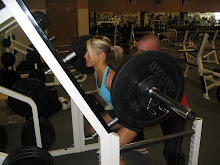It's been awhile since the event, but I figured I'd do a quick post on the UCC last month. What a cool event! The number of people involved was inspiring and hearing stories, watching videos, rockin' to DJs and live bands and just enjoying the company of others helped keep those pedals moving for 24 hours straight. The result? 40 teams, hundreds of people and over $44,800 raised for the Lance Armstrong (LiveStrong) Foundation!!!
Because of all you riders and all of you who generously and lovingly donated, there are even more funds for CANCER RESEARCH and PATIENT CARE. Seeing all the names of those affected by cancer on the yellow linked-chain was moving and many people wore signs on their back saying 'Riding in Honor of', 'Riding in Memory of' or 'Riding in Celebration of (name of a survivor)' - very powerful!
We ended the 24-hrs with a teary-eyed, yet joyful picture-video and presentation by the Bocks family, whose son, Duncan, was diagnosed with cancer when he was a baby. He is now a happy, healthy 14-yr old - thanks to events like this that raise $$ for hospitals and research! Duncan even rode the last hour of the event and was cheered on by everyone in the room!! :)
Thank you so much for your support, in so many ways.
Team Valeo-24
Jessica Oosting
Mike Luepke
Tarra Miedema
Kevin Carlson
Emily Nicholson
Shawn Luepke
Tiffany Andre
Anne Veltema
Bill Bredemier
Karin Ashcroft
Bret Vandenbil
Leslie Brown
Carmen Hannah
Duncan Bocks
David Dupato
Jessica Oosting
Mike Luepke
Tarra Miedema
Kevin Carlson
Emily Nicholson
Shawn Luepke
Tiffany Andre
Anne Veltema
Bill Bredemier
Karin Ashcroft
Bret Vandenbil
Leslie Brown
Carmen Hannah
Duncan Bocks
David Dupato
Team Valeo-12
Jessica Oosting
Mike Luepke
Ronda Dryfhout
Hannah Dryfhout
Jeremy Brieve
Tricia Schaap
Matt Metzger
Lee Tanis
Jeff Tanis
Chelsea Brown
Ashley Huntey
Kelly Slagh
Barb Ellis
Sarah Ellis
Jessica Oosting
Mike Luepke
Ronda Dryfhout
Hannah Dryfhout
Jeremy Brieve
Tricia Schaap
Matt Metzger
Lee Tanis
Jeff Tanis
Chelsea Brown
Ashley Huntey
Kelly Slagh
Barb Ellis
Sarah Ellis

Riding in honor and support of our dear pastor's wife and friend, Christina!







